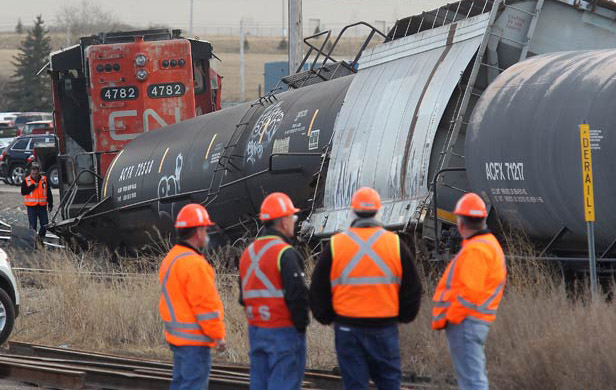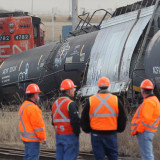
OTTAWA – CN Rail, at the urging of Chinese-owned Nexen Inc., is considering shipping Alberta bitumen to Prince Rupert, B.C., by rail in quantities matching the controversial Northern Gateway pipeline, documents show.
Internal memos obtained by Greenpeace under the Access to Information Act show the rail carrier raised the proposal last March with Natural Resources Canada.
Plan “B” for Enbridge pipeline
“Nexen Inc. is reportedly working with CN to examine the transportation of crude oil on CN’s railway to Prince Rupert, B.C., to be loaded onto tankers for export to Asia,” states a departmental briefing note setting up the March 1 meeting.
An attached CN presentation paper notes:
[quote]CN has ample capacity to run seven trains per day to match Gateway’s proposed capacity.[/quote]
CN is denying it has made a specific proposal for Prince Rupert but says it will consider any such project as it comes up.
Greenpeace provided the documents to The Canadian Press.
The proposed Enbridge Northern Gateway pipeline, which would carry crude oil to Kitimat, B.C., has met fierce opposition from First Nations and environmentalists.
Greenpeace researcher Keith Stewart said the CN rail pitch has the appearance of a “Plan B” in case Northern Gateway is blocked, but that it raises “the same or greater risks.”
The ghost of Lac-Mégantic
The horrific Lac-Megantic, Que., disaster in July, which claimed 47 lives when a train carrying crude oil derailed and exploded, has focused intense scrutiny on the burgeoning oil-by-rail industry.
Some 5.5 million litres of oil either burned or leaked into the environment in Lac-Megantic. The fire burned for four days.
CN downplays plans
A spokesman for CN Rail told The Canadian Press in an email that “no specific crude-by-rail project to Prince Rupert (was) discussed” at the March meeting with Natural Resources Canada.
The company “does not disclose publicly its commercial discussions with customers,” Mark Hallman said in the email.
“CN will continue to explore new opportunities to move crude oil safely and efficiently to markets,” Hallman wrote.
[quote]The company will consider concrete crude-by-rail proposals, including any specific project to move crude to Prince Rupert. However, there is no infrastructure in place at Prince Rupert to transfer crude oil from train tank cars to vessels.[/quote]
Oil-by-rail was government’s suggestion
Hallman also noted it was the government that asked CN for the meeting, not the other way around.
Indeed, the documents obtained by Greenpeace show Ottawa was intensely interested in oil by rail, at least prior to the Quebec accident.
“NRCan is currently meeting with Transport Canada to mutually understand how rail could be part of a solution to current market access challenges,” says an undated memorandum for Natural Resources Minister Joe Oliver.
The memo describes rail as “an increasingly viable option” and states that carriers Canadian Pacific and CN “have indicated that the potential to increase rail movements of crude oil is theoretically unlimited.”
Rail officials had indicated that a project to bring crude to port for tanker export “is likely in future.”
No environmental assessment
A separate memo for International Trade Minister Ed Fast and Dennis Lebel, then the transport minister, assets that Transport Canada “has identified no major safety concerns with the increased oil on rail capacity in Canada, nor with the safety of tank cars …”
The memo states that “transportation of oil by rail does not trigger the need for a federal environmental assessment” but notes that “proposals to construct new infrastructure to support the activity” may require an assessment under the Canadian Environmental Assessment Act.
Memo blacked out
The “Departmental Position” on oil by rail is entirely blacked out from the memo.
Greenpeace’s Stewart said the Lac-Megantic tragedy revealed that federal safety regulations hadn’t kept pace with the oil-by-rail boom. Stewart added:
[quote]If the government or industry imagines they can use these regulatory loopholes to do an end-run around opposition to tar sands moving through those lands or waters, they will be in for a rude awakening. [/quote]
Rail seen as alternative to unpopular pipelines
Opposition in Canada to the Northern Gateway and in the United States to TransCanada’s Keystone XL pipeline has keyed on stopping or slowing development of Alberta’s oilsands development.
The undated memo to Oliver, the natural resources minister, suggests that’s wishful thinking.
“Despite difficulties related to new pipeline capacity, Canadian crude producers are unlikely to slow down production and will turn to rail to ensure their product reaches market,” said the memo.
[quote]To date, there hasn’t been a project to bring crude by rail to port for tanker export, however rail officials indicate that such a project is likely in future.[/quote]
— With additional reporting by Dene Moore in Vancouver


Lets just close fort Mcmurray’s tar sands for good cause anybody whos an employee and is living around the upgraders are sure to get cancers that are caused by petrolium so are they really any better off.